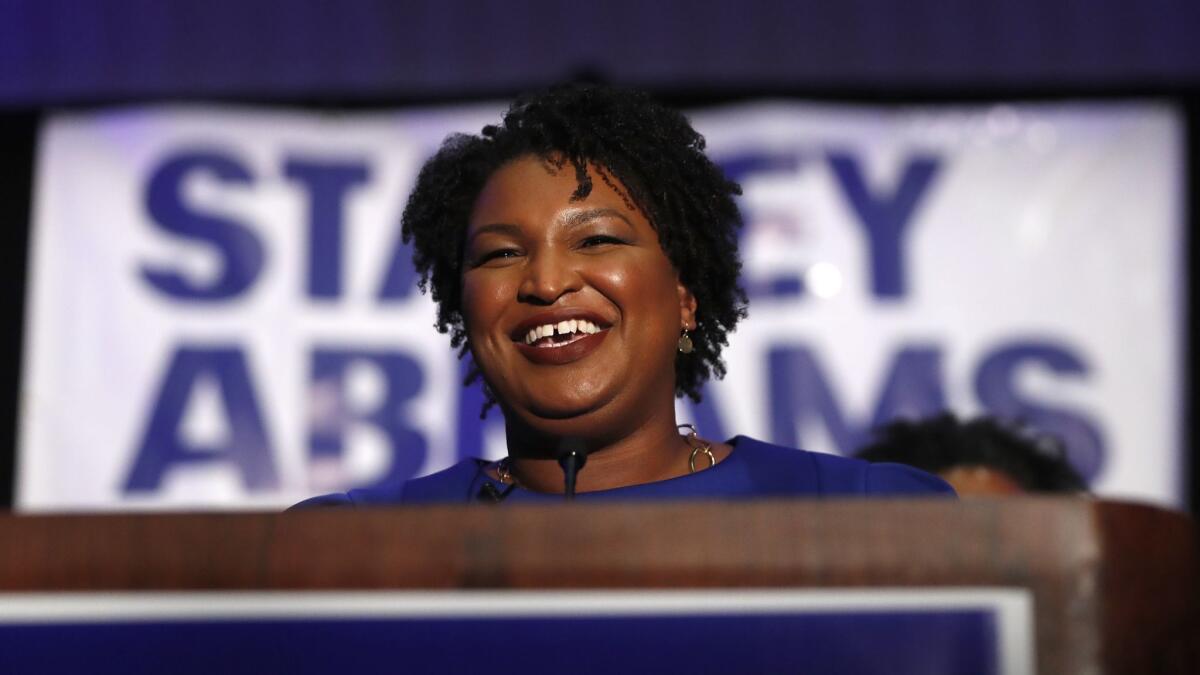Stacey Abrams made history. But is deeply conservative Georgia ready to elect a black woman governor?

- Share via
Reporting from Atlanta — Stacey Abrams made history Tuesday night, becoming the first black woman to win the gubernatorial nomination of a major political party.
Having easily defeated her Democratic competitor in the Georgia primary, the 44-year-old former state House minority leader will face the yet-to-be-determined Republican candidate in November.
The prospect of a black woman governor in the Deep South is energizing Democrats. They are portraying her candidacy as an indication of a backlash against President Trump and his alienation of minority communities, which have had low turnout in elections but now might be more motivated to vote.
“We are writing the next chapter of Georgia’s future, where no one is unseen, no one is unheard and no one is uninspired,” Abrams said to supporters in Atlanta on Tuesday night to cheers of “History!” and “You look like a governor!” “We are writing a history of a Georgia where we prosper — together.”
Abrams beat her Democratic opponent, Stacey Evans, who is white, by a 3 to 1 margin, even crushing her in the suburban district Evans once represented as a state legislator.
But the hurdles for a Democratic candidate — black or white — are high in this conservative Southern state, where Trump won by 5% in 2016, and nearly two decades have passed since a Democrat was elected governor.
In the November general election, Abrams’ opponent will be either Lt. Gov. Casey Cagle, the leader of the moderate business wing of Georgia’s Republican Party, or Georgia Secretary of State Brian Kemp.
Both candidates fell short of securing 50% of the party’s vote and face a July runoff.
To get a sense of at least one chunk of the Republican electorate, consider Kemp’s campaign ads. One showed him pointing a shotgun at a young man interested in dating his daughter. In another, Kemp said he owned a “big truck” just in case he needed to “round up criminal illegals” and “take them home myself.”
Democrats who hope that Abrams’ primary victory could be part of a wave of success across Georgia and other conservative states point to the December victory of Democrat Doug Jones over Republican Roy Moore in a special Senate election in Alabama. Black women, who turned up at the polls in large numbers, played a key role in that outcome.
But that was a highly unusual election because of accusations Moore faced over the sexual abuse of minors, and even then he was only narrowly defeated. When Democrats smelled opportunity in Georgia last year and spent record amounts on their candidate, Jon Ossoff, in a special election for a seat in the U.S. House, he still lost to Republican Karen Handel.
In the Georgia gubernatorial primary campaign, Abrams distinguished herself from Evans not so much on policy issues — both candidates pledged to increase the minimum wage, expand Medicaid and invest in education — but on strategy.
Evans, 40, an attorney who grew up in Ringgold, a small town in Georgia’s northwest corner, focused on winning over swing voters and reached out to the old Democratic Party coalition in Georgia, which includes minorities but also moderate whites.
Abrams focused on energizing minorities and young voters who have not always registered to vote or turned up at the polls.
Andra Gillespie, assistant professor of political science at Emory University, summarized the strategy: “It doesn’t make sense to go after centrist voters who don’t exist anymore or to go after working-class voters who have been voting Republican since before 2016.”
“What Abrams is basically arguing is, ‘I can at least do as well as [white candidates], and at best I can actually probably excite more women and minority voters and get them out to vote in ways that my white counterparts might not be able to,’” she said.
Data were not immediately available on minority turnout Tuesday, but a total of 554,450 people voted in the Democratic primary, compared with 607,875 in the Republican one — a much smaller gap between the parties than in 2010, the last time both parties had contested primaries.
The same approach may offer Abrams the best chance — even if it’s a long shot — in the general election.
“It’s an uphill fight, but it’s a fight she could win,” said Kerwin Swint, a professor of political science at Kennesaw State University, noting that the state has slowly been shifting from red to purple as its population becomes more diverse. “In order to win, there has to be a huge blue wave in November.”
Swint said that energizing Democratic voters would require Abrams to mount an aggressive campaign against her Republican opponent — a tactic that might risk alienating more moderate voters.
“She’s the kind of candidate that a lot of Democrats salivate over,” Swint said. “For that reason, she’s the kind of candidate a lot of conservative moderates won’t want to go near…. Her gender, her race, plus her politics, those things in combination will make it a challenge.”
On Tuesday night, Abrams acknowledged it would be a “tough race,” but urged supporters to take courage from the state’s rich civil rights history.
“We must remember we’re in the state where the red clay gives life to generations of dreamers,” she told hundreds of supporters. “The state where Martin marched on ballot boxes and challenged a nation’s conscience. The Georgia that gave us the Godfather of Soul and the queen of the Met — and that sent a peanut farmer to the Oval Office.”
Born and raised in Gulfport, Miss., Abrams is the second of six children. Her parents, a school librarian and a shipyard worker, moved to Atlanta when she was in high school to to pursue graduate studies in divinity at Emory University and become United Methodist ministers.
After graduating as class valedictorian at Avondale High School, east of Atlanta, Abrams attended Spelman College, Atlanta’s leading historically black college for women, and then earned a master’s degree from the Lyndon B. Johnson School of Public Affairs at the University of Texas and a law degree from Yale University.
Returning to Atlanta to work as a tax attorney, she was appointed Atlanta’s deputy city attorney in 2003 and elected to Georgia’s State House in 2006, becoming minority leader in 2010.
As she climbed the political ladder, Abrams found time to take on a side gig as a romance novelist. Under the pen name Selena Montgomery, she has published eight thrillers with titles such as “Rules of Engagement,” “Hidden Sins” and “The Art of Desire.”
She has won endorsements from well-known Democrats, including Hillary Clinton and Sens. Bernie Sanders, Cory Booker, Kirsten Gillibrand and Kamala Harris.
She even counts some Georgia Republicans among her admirers. Erick Erickson, a conservative American commentator and radio host, said this year that while he disagreed with Abrams on most policy issues, she was one of the best subjects he had ever interviewed.
“Super sharp, very witty, and self-deprecating,” he wrote on Twitter. “She’ll be formidable as a candidate.”
Her Democratic opponent tried to discredit her as a moderate, accusing her of “cutting a deal” with Republican leaders to cut a popular scholarship program funded by the Georgia lottery.
At the same time, Abrams has been criticized for being too radical.
“In choosing Stacey Abrams the @GeorgiaDemocrat just nominated the most extreme, far-left candidate in its party’s history,” the Georgia Republican Party tweeted Tuesday.
Republicans are also expected to seize on Abrams’ struggles with debt and failure to pay taxes. Financial disclosure forms show Abrams owes $50,000 in back taxes and holds $170,000 in credit card and student loan debt.
“I am in debt, but I am not alone,” Abrams wrote last month in an article for Fortune magazine, noting that she borrowed money after college to support her parents. “Debt is a millstone that weighs down more than three-quarters of Americans. It can determine whether we are able to run for office, to launch a business, to quit a job we hate. But it should not — and cannot — be a disqualification for ambition.”
The New Georgia Project, a nonpartisan effort that Abrams set up in 2013 to register 800,000 unregistered minority voters, has also faced criticism that it fraudulently registered voters and wasted millions of dollars from private donors.
“The only way for voters to get clarity on a growing list of ethical issues concerning her finances is to see her tax returns and payment history for her entire tenure in the state Legislature,” Georgia GOP Chairman John Watson told the Atlanta Journal-Constitution on Tuesday night. “There should be no ‘forgetting’ or ‘misfiling’ with the IRS.”
Still, political analysts say that Abrams’ overwhelming primary victory already goes a long way in countering the idea that African American Democrats cannot be viable candidates in conservative Southern states.
“She passed the first test,” Gillespie said. “The second test is not just whether or not she wins, because the fundamentals still favor Republican candidates in this state … but if she’s actually able to over-perform relative to other Democratic candidates.”
In the 2014 election for governor, Jason Carter, a white state senator and the grandson of former President Jimmy Carter, won 44.9% of the vote compared with incumbent Nathan Deal’s 52.7%.
Gillespie said that simply doing better than Carter would be a victory of sorts for Abrams.
“The problem might just be a problem of numbers,” she said. “The problem is the D behind her name, not the color of her skin. And that’s something that could be overcome in the long run, with a greater mobilization within the party and waiting for the demographics of the state to catch up.”
More to Read
Sign up for Essential California
The most important California stories and recommendations in your inbox every morning.
You may occasionally receive promotional content from the Los Angeles Times.











